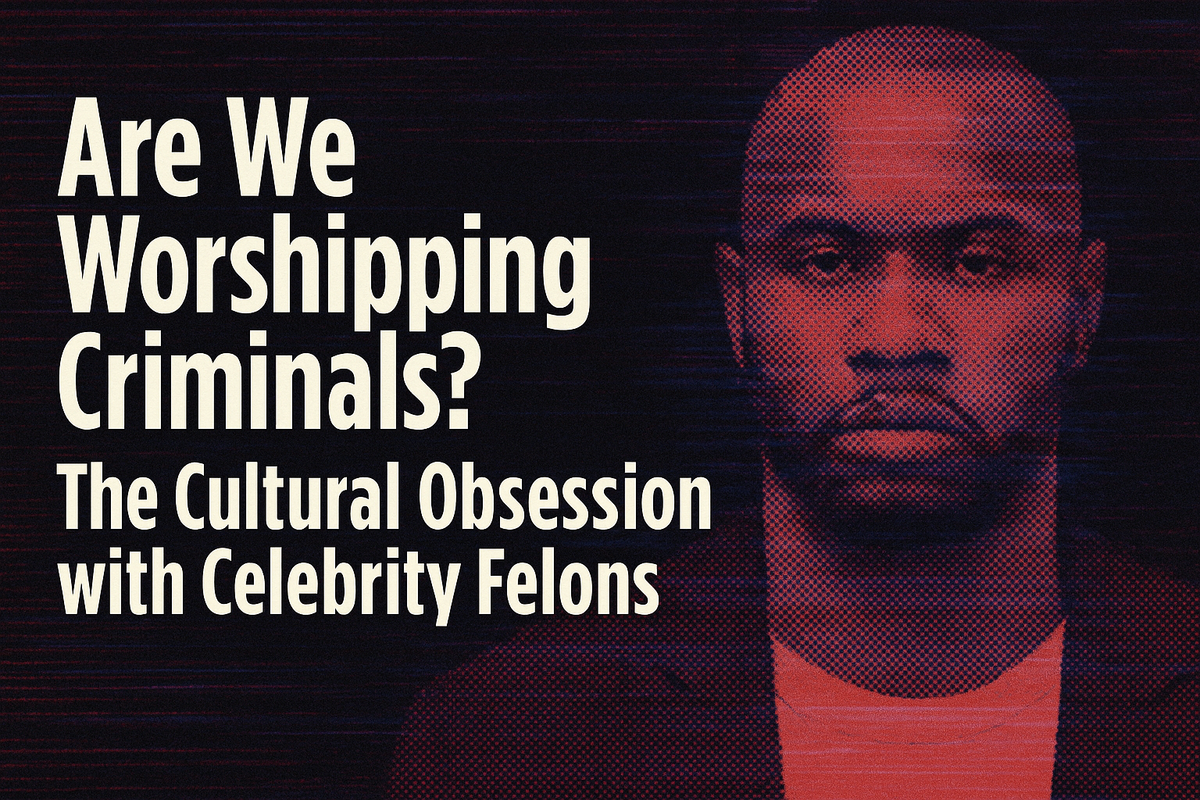Are We Worshipping Criminals? The Cultural Obsession with Celebrity Felons
From chart-topping rappers to Oscar winners with mugshots, society’s obsession with celebrity felons is growing. This exposé uncovers why fans idolize accused stars, how media glamorizes crime, and what it says about justice, power, and morality in pop culture.

Los Angeles, CA | June 30, 2025
Once upon a time, a felony charge would have ended a celebrity's career. Today, it might be the best PR move they’ve got. In 2025, we’re not just forgiving accused or convicted stars we’re glorifying them, streaming their music more, reposting their mugshots like merch, and turning their court dates into red carpet events.
From Gunna to Sean "Diddy" Combs to Tory Lanez, the culture not only accepts criminality it devours it, wraps it, and markets it. And it raises the question:
Are we worshiping criminals? Or is the system set up to make sure we do?
The Trending Power of Crime
When Tory Lanez was found guilty in 2023 of shooting Megan Thee Stallion, you'd expect his career to fold. But his music sales temporarily spiked (Source: Google Trends), his fans protested outside the courtroom, and hashtags such as #FreeToryLanez went viral on X (formerly Twitter) for weeks.
Gunna, who was previously linked to a broad RICO indictment of Atlanta rappers, also came back strong. Following a plea deal in late 2022, he released a hit album that landed at No. 2 on Billboard leading legal commentators on CourtListener to note how legal fame had apparently boosted his stature.
Meanwhile, the Diddy saga of 2024-2025 involving multiple civil suits alleging sex trafficking, assault, and racketeering hasn’t deterred his business empire. Despite new filings unearthed on Justia, his Cîroc brand is still featured at VIP events, and his music royalties continue to flow in. The conclusion? Infamy sells.
Crime Pays — When You’re Rich and Famous
It's not that the public doesn't mind criminal charges — it's because fame warps justice and perception. Celebrities in celebrity culture:
- Turn a court proceeding into free advertising
- Make a mugshot into a meme
- Turn an indictment into a comeback story
Celebrities, equipped with top-notch PR agencies, lawyers, and brand strategists, can refranchise charges into stories of survival, betrayal, or injustice. The public, prepped for drama, buys it hook, line, and sinker.
This is not exclusive to the music world. Hollywood star Ezra Miller's chaotic behavior and court issues of 2022–2024 did nothing to prevent The Flash from collecting millions from box offices. Despite leaked police reports on Archive.org and horrifying clips making the rounds online, Miller has been rehabilitated in quiet manner into studio sessions in 2025.
Social Media: The Court of Public Confusion
On X, Instagram, and TikTok, celebrities who are accused of very serious crimes continue to have and expand enormous followings. Their fans:
- Attacked victims
- Dismissed lawsuits
- Fabricated conspiracy theories about the charges
Why? Because social media isn't designed for subtlety it's designed for devotion, virality, and image control.
Case in point: Amid Diddy's 2024 lawsuit firestorm, his camp deployed retro performance footage, Black business spotlights, and family photos to fill timelines. The end result? Sentiment scores ticked up even as filings mounted.
At its core, court papers can't match edited Instagram reels.
Case Study: Tory Lanez From Conviction to Cult Following
Background:
Rapper Tory Lanez (Daystar Peterson) was accused in 2020 of shooting fellow rapper Megan Thee Stallion in the foot after a fight after a party in Hollywood Hills. Lanez denied the allegations for years — even releasing music about the case and proclaiming innocence.
Legal Outcome:
On December 23, 2022, a Los Angeles jury convicted Lanez on three felony charges, including:
- Assault with semiautomatic firearm
- Possession of loaded, unregistered firearm in a vehicle
- Discharging a firearm with recklessness
He was given 10 years behind bars in August 2023.
Cultural Response:
Far from fading:
- Lanez's streaming figures shot up shortly after the conviction — with Spotify seeing a 12% increase in U.S. plays (Google Trends reflected that surge).
- The hashtag #FreeToryLanez hit 500 million+ views on TikTok.
- CourtListener preserved more than 350 public court records and amicus briefs related to the case: Link
Fanbase Behavior:
Supporters of Tory Lanez started claiming that Megan Thee Stallion was lying, posting hundreds of conspiracy theory threads across Reddit and Twitter.
Others even raised money for his appeal, disregarding the mass physical evidence and victim testimony.
Analysis
This case highlights how fame warps accountability. Lanez not only weaponized his fame throughout the trial he monetized it as well in merch, music, and social media popularity. His felony conviction was framed as a plot twist, rather than as a red flag for society.
From Criminal to Cultural Icon
America has a long, problematic history of making outlaws into icons:
- Al Capone
- Tupac Shakur
- Martha Stewart
- Even O.J. Simpson
The cycle continues: crime is identity, and identity is brand. When a celebrity is perceived as "wronged by the system" particularly if race, class, or fame are present public opinion usually shifts from shame to sympathy.
In 2025, celebrities such as Gunna are even using their courtroom drama as part of their artistic storytelling. His recent album features interludes about jail time, plea bargains, and street loyalty all presented in minimalist branding mimicking prison design.
The album wasn't heard — it was celebrated.
The Two Americas: Justice for the Rich and Famous vs. the Forgotten
Here's the truth: public fascination with celebrity offenders creates a dual system of justice.
For the ordinary citizen:
- Felony conviction ruins future career opportunities
- Lawful debt accrues
- Stigma for life
For the celebrity:
- Trouble with the law frequently equals exposure
- Their name is trending
- Their reputation is made all the more "edgy" or desirable
In Diddy's instance, in spite of increasing legal battles and horrific accusations, he's still invited to hot parties, spotted in business meetings, and referred to as "legendary" in the media accounts. Victims, on the other hand, can't get heard.
It's not only unfair — it's risky.
Psychological Fixation: Why We Can't Look Away
So why do we persist in romanticizing celeb criminals?
- Fame Bias
We're hardwired to believe and worship familiar names even poisonous ones.
- Redemption Addiction
American culture is fond of a comeback tale. Guilty? All the better you have "room to grow."
- Algorithmic Amplification
The more that we respond to their scandal, the more platforms expose us to more of the same.
- Projection & Parasocial Relationships
Most fans identify with celebrities and feel personally criticized when their icons are attacked.
This provides a emotional shield which protects celebrities from criticism — even if victims present receipts, papers, and lawsuits.
When Lawsuits Are Simply "Bad Press"
Thanks to websites such as CourtListener, Justia, and PACER, we are privy to legal documents in direct conflict with celebrity claims. But that usually doesn't interest their die-hard fans or arms-length observers.
A PR team can spin a:
- RICO charge into a "witch hunt"
- Assault lawsuit into a "jealous ex's revenge"
- Trafficking allegation into "cancel culture gone too far"
These are not hypotheticals. Files from Jane Doe v. Sean Combs, preserved by CourtListener, detail gruesome claims that garnered much less attention than Diddy's legal reaction or celebrity supporters tweeting #WeStandWithDiddy.
Victim Silencing & the Celebrity Machine
The ascension of the "criminal celebrity" doesn't merely divert us — it harms survivors.
Cassie Ventura's suit against Diddy, filed late in 2023, was greeted with:
- Internet ridicule
- Fan conspiracy threads
- Death threats
Even with a hush-hush settlement, several other women emerged, some aided by legal documents stored on Justia. But the press soon forgot.
In the meantime, Diddy was back to hyping new tunes and high-end brand collabs — because survivors lack publicists.
Is the Culture to Blame?
While the justice system is at fault, so is the culture:
Media publications continue to cover these celebrities positively, being afraid of losing access.
- Brands keep collaborating until public pressure pushes them.
- Streaming services shy away from taking down content, using "art vs. artist" tropes.
- But for every PR-suspended story is a victim whose voice becomes silenced.
What Can Be Done?
As consumers, creators, and journalists, we need to take back our critical gaze.
Solutions:
- Back independent media that puts victims first.
- Fact-check claims through outlets such as CourtListener and Justia.
- Don't take the bait on PR stunts "comeback" interviews, redemption reels, etc.
- Push for accountability in partnerships demand brands drop accused stars until resolved.
Ultimately, celebrity does not equal immunity and it’s time our culture remembered that.
Final Thought: Crime Isn’t Clout
In 2025, we’ve crossed a dangerous line: treating serious allegations as branding opportunities and felony cases as launchpads for rebranding.
But behind each viral mugshot photo or viral "Free [Insert Rapper]" chant, there's a victim whose narrative is disappearing not because it's a lie, but because it's in the way of the image economy.
We can love art, respect artists, and still call for justice.
But we have to stop idolizing criminals.
Sources :
- CourtListener – Jane Doe v. Sean Combs
- Justia – Civil & Criminal Filings (Diddy, Gunna, Tory Lanez)
- Google Trends – “Free Tory Lanez,” “Gunna RICO,” “Diddy Lawsuit 2025”
- Archive.org – Leaked Footage, Legal Docs
- Official Press Releases from PACER, U.S. District Courts
- Reputable News: The Guardian, Variety, Rolling Stone, The New York Times, Bloomberg




